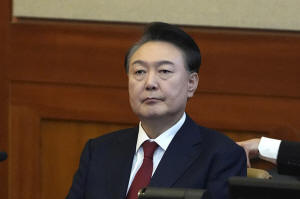What to expect after South Korea’s Constitutional Court rules on the
impeachment of President Yoon
[March 11, 2025]
By HYUNG-JIN KIM
SEOUL, South Korea (AP) — South Korea’s Constitutional Court could soon
rule on whether to dismiss or reinstate impeached conservative President
Yoon Suk Yeol. That doesn't mean the political crisis caused by Yoon’s
short-lived imposition of martial law is over.
South Korea's already-severe political divide between conservatives and
liberals will likely intensify as Seoul grapples with major foreign
policy challenges like U.S. President Donald Trump’s “America First”
foreign policy platform and North Korea’s increasing military
cooperation with Russia.
Here’s what to expect about the court’s likely impending verdict on
Yoon's Dec. 3 martial law decree that is testing South Korea's
democracy.
What might the court do?
The Constitutional Court has been deliberating whether to formally end
Yoon’s presidency since the liberal opposition-controlled National
Assembly in December voted to suspend him. Yoon is also facing a
separate criminal trial after his arrest and indictment by prosecutors
in January for alleged rebellion in connection with his martial law
decree.
If the Constitutional Court rules against him, he will be officially
thrown out of office and a national election will be held for a
successor within two months.
If the court rules for Yoon, he would return to presidential duties. It
was earlier unclear whether or how soon he might return to work, because
he had been in jail until Saturday.
Yoon is South Korea’s first president who has been arrested while in
office, and there are no clear laws or past rulings that could guarantee
his immediate return to office, analysts say. But he was eventually
released from prison, after a Seoul court canceled his arrest and
allowed him to stand his criminal trial without being detained.

After hearing 16 witnesses, the court ended arguments on Feb. 25, but it
hasn’t announced when it will announce a verdict. Observers say it could
come as early as this week or next week, citing past cases where the
court ruled on former presidents.
The biggest issue is why Yoon sent hundreds of troops and police
officers to the assembly after declaring martial law. Yoon says he
wanted to maintain order, but some top military and police officers sent
there have said that Yoon ordered them to drag out lawmakers to block an
assembly vote about his decree or detain his political rivals.
Lawmakers eventually managed to get in and vote down his decree. No
violence and no arrests of politicians actually happened.
What fallout is expected?
Hundreds of thousands of people had earlier rallied near the assembly,
calling for Yoon’s ouster. But those protests have since been scaled
down after Yoon's impeachment. Yoon supporters have also regularly
staged major rallies to denounce Yoon’s impeachment.
[to top of second column]
|

South Korea's impeached President Yoon Suk Yeol attends a hearing of
his impeachment trial at the Constitutional Court in Seoul, South
Korea, Tuesday, Feb. 11, 2025. (AP Photo/Lee Jin-man, Pool, File)

Ousting Yoon from office would prompt his supporters to ramp up
protests before a presidential byelection to boost prospects for a
new conservative president. Reinstating him would rekindle huge
liberal demonstrations demanding Yoon’s resignation, according to
Choi Jin, director of the Seoul-based Institute of Presidential
Leadership.
“No matter what decision the Constitutional Court comes up with,
South Koreans’ division and extremely polarized politics can’t help
but to deepen,” Choi said.
Acting President Choi Sang-mok said Tuesday the government won’t
tolerate any illegal, violent protests, saying concerns about
physical clashes between pro- and anti-Yoon forces are growing ahead
of the court's verdict on Yoon.
Pro-Yoon rallies turned violent in January when protesters stormed
the Seoul Western District Court after it approved Yoon’s formal
arrest warrant. The protesters attacked police officers with bricks,
steel pipes and other objects. The attack injured 17 police
officers.
What about Yoon's rebellion trial?
Investigative authorities have alleged that Yoon’s martial law
enforcement amounted to rebellion, describing it as riots with the
purpose of undermining the constitution. If he's convicted of
rebellion, he could face the death penalty or life imprisonment.
Results of Yoon’s criminal trial will likely be affected by the
Constitutional Court ruling.
The Constitutional Court's endorsement of Yoon's impeachment would
confirm his violation of the constitution and could help increase
prospects for Yoon's conviction of rebellion, said Park SungBae, a
lawyer specializing in criminal law.
But a rejection would mean that the Constitutional Court believed
Yoon's martial law decree wasn't serious enough to warrant
dismissal, or maybe wasn't even illegal. Prosecutors would
subsequently find it burdensome to raise Yoon's alleged rebellion at
the criminal trial, Park said.
Prosecutors indicted Yoon only on charges of rebellion, because he
has presidential immunity from most criminal prosecution. Some could
question whether his criminal trial should continue if his
impeachment is overturned at the Constitutional Court.
Even if the Constitutional Court reinstates Yoon, Choi said that
Yoon's authority has already been badly hurt, so South Korea's
leadership vacuum will likely continue.
All contents © copyright 2025 Associated Press. All rights reserved |